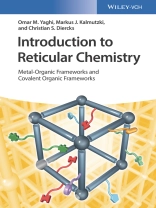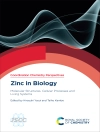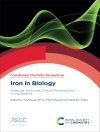A much-needed introduction to the chemistry and design principles behind important metal-organic frameworks and related porous materials
Reticular chemistry has been applied to synthesize new classes of porous materials that are successfully used for myriad applications in areas such as gas separation, catalysis, energy, and electronics. Introduction to Reticular Chemistry gives an unique overview of the principles of the chemistry behind metal-organic frameworks (MOFs), covalent organic frameworks (COFs), and zeolitic imidazolate frameworks (ZIFs). Written by one of the pioneers in the field, this book covers all important aspects of reticular chemistry, including design and synthesis, properties and characterization, as well as current and future applications.
Designed to be an accessible resource, the book is written in an easy-to-understand style. It includes an extensive bibliography and offers figures and videos of crystal structures that are available as an electronic supplement. Introduction to Reticular Chemistry:
-Describes the underlying principles and design elements for the synthesis of important metal-organic frameworks (MOFs) and related materials
-Discusses both real-life and future applications in various fields, such as clean energy and water adsorption
-Offers all graphic material on a companion website
-Provides first-hand knowledge by Omar Yaghi, one of the pioneers in the field, and his team.
Aimed at graduate students in chemistry, structural chemists, inorganic chemists, organic chemists, catalytic chemists, and others, Introduction to Reticular Chemistry is a groundbreaking book that explores the chemistry principles and applications of MOFs, COFs, and ZIFs.
İçerik tablosu
Foreword
Introduction
PART I: Metal-Organic Frameworks
1. Emergence of Metal-Organic Frameworks
2. Determination and Design of Porosity
3. Building Units of MOFs
4. Binary Metal-Organic Frameworks
5. Complexity and Heterogeneity in MOFs
6. Functionalization of MOFs
PART II: Covalent Organic Frameworks
7. Historical Perspective on the Discovery of Covalent Organic Frameworks
8. Linkages in Covalent Organic Frameworks
9. Reticular Design of Covalent Organic Frameworks
10. Functionalization of COFs
11. Nanoscopic and Macroscopic Structuring of Covalent Organic Frameworks
PART III: Applications of Metal-Organic Frameworks
12. The Applications of Reticular Framework Materials
13. The Basics of Gas Sorption and Separation in MOFs
14. Carbon Dioxide Capture and Sequestration
15. Hydrogen and Methane Storage in MOFs
16. Liquid and Gas-Phase Separation in MOFs
17. Water Sorption Applications of MOFs
PART IV: Special Topics
18. Topology
19. Metal-Organic Polyhedra and Covalent Organic Polyhedra
20. Zeolitic Imidazolate Frameworks
21. Dynamic Frameworks
Yazar hakkında
Omar M. Yaghi is the James and Neeltje Tretter Chair Professor of Chemistry at University of California, Berkeley, and a Senior Faculty Scientist at Lawrence Berkeley National Laboratory, USA. He is the Founding Director of the Berkeley Global Science Institute, and the Co-Director of the Kavli Energy Nano Sciences Institute, and the California Research Alliance by BASF. His work encompasses the synthesis, structure and properties of inorganic and organic compounds and the design and construction of new crystalline materials. He published over 250 articles, and he is widely known for the discovery and for pioneering the development of several extensive classes of new materials (MOFs, COFs, and ZIFs).
Markus J. Kalmutzki is an applications specialist for measurement of porosity and particle characterization at Anton Paar Germany Gmb H. Before he was a DFG-postdoctoral fellow in the group of Omar M. Yaghi at the Universtity of California, Berkeley.
Christian S. Diercks is currently pursuing his Ph.D. in the group of Omar M. Yaghi at the University of California, Berkeley.












